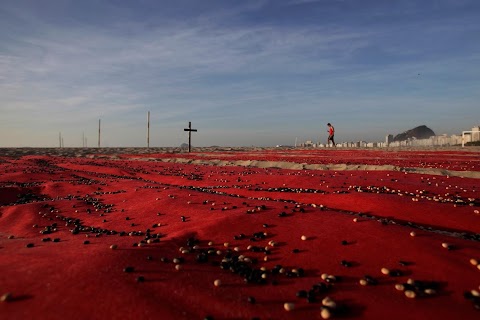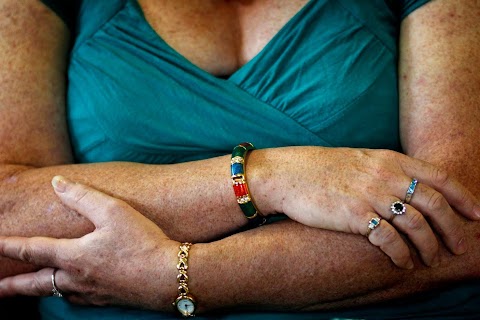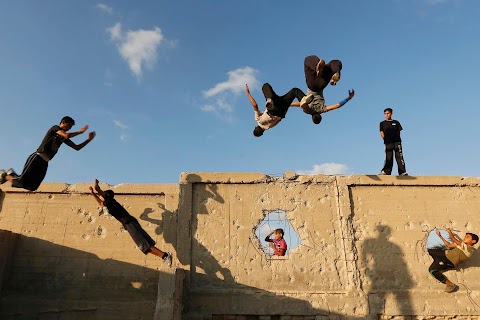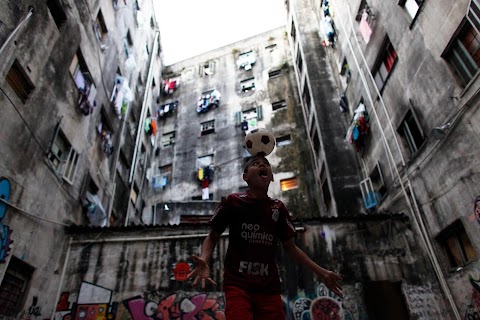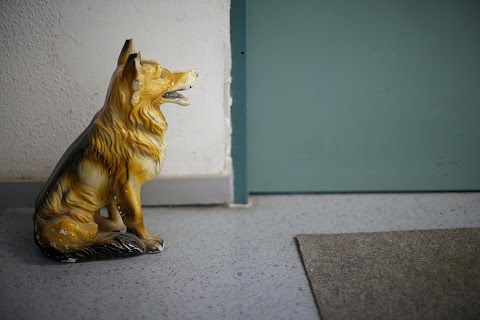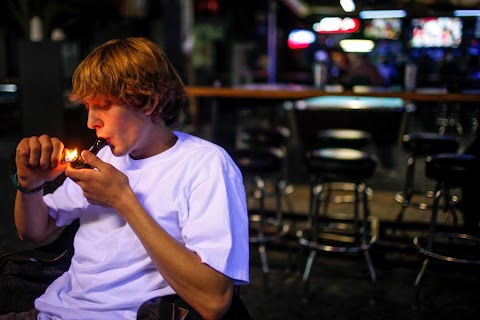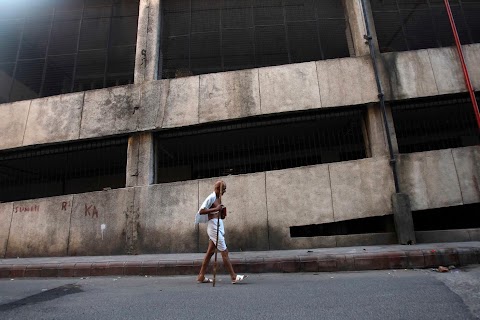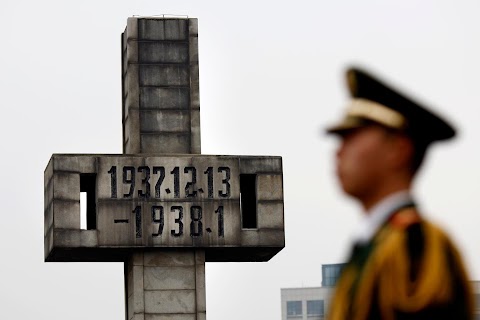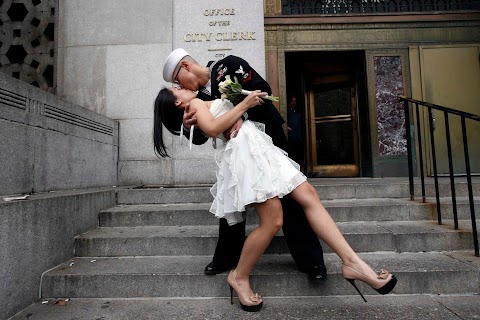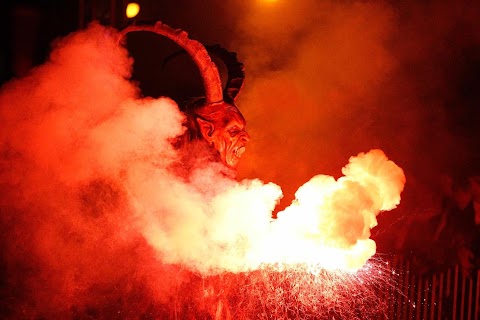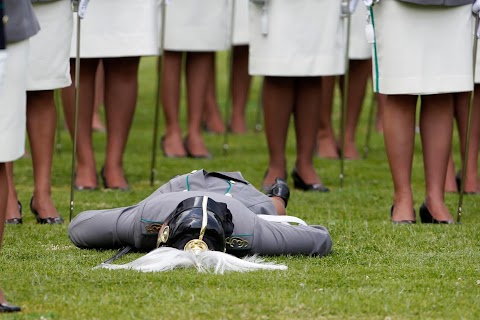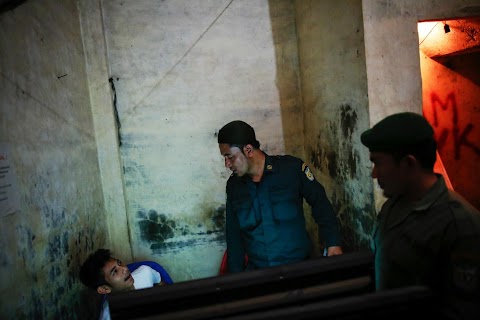
Life under Sharia
 Damir Sagolj
Damir Sagolj
Indonesia has the world’s largest Muslim population and nowhere is the faith more strictly interpreted than in Aceh, the country’s only province to have implemented sharia, or Islamic laws.
Sharia is enforced by dedicated police units who spend much of their time reprimanding those who break the rules – like this student who receives a stern lecture for playing games in an internet cafe during school hours.

Human rights activists warn that some of Aceh’s sharia laws infringe on people’s rights and hit the poor, women, minorities and young people disproportionately hard.
These members of a punk band named "Trotoar Chaos" were some of those who got on the wrong side of sharia, and were publically punished by having their heads shaved by police. They remain defiant nevertheless: “Now I want to fight more,” one of them says.
AUDIO TRACK: Young members of the band perform on improvised instruments.

Sharia police patrol parks and beaches every day looking for those violating the law: unmarried couples, Muslim women without headscarves or wearing tight clothes, and people drinking alcohol or gambling. On Fridays men are supposed to attend mosque for prayers and all-female units are deployed to make sure they do so.
This female sharia officer confronts a man who began eating his lunch minutes before prayers were due to start, and lectures him as he holds a piece of chicken in his hand. Later, the man abandoned his meal and went to pray.

Aceh was devastated in 2004 by a tsunami that killed 170,000 people across the province. The monument where these visitors take pictures is a memorial to that disaster.
Some residents and Muslim legal scholars in the province believe that the tsunami was a punishment from God against those who broke Islamic laws, and they fear it might happen again. Following the disaster, more ambitious implementation of sharia kicked in.
Slideshow

Winda Wahyuni kisses the hand of her husband Ahmad Yasir Saputra after they got married, having met a year before on Facebook. Dating on social networks has become increasingly popular in Aceh, where it is a crime for an unmarried man and woman who are not related by blood to associate in an "isolated place."

The young couple pray during their wedding ceremony in a Banda Aceh mosque.

Muslim students pray at an Islamic boarding school, where most of the students are orphans whose parents died in the conflict that afflicted Aceh for decades, or in the devastating 2004 tsunami.

Students at the school wash before going to pray.

A sharia policeman shows a set of dominos that his unit found in a bag belonging to one of three schoolboys who were caught smoking cigarettes when they should have been at school. The boys ran off from the police without getting caught, and the officers threw the dominos into the mud.

Sharia policemen lecture a student who was caught playing games in an internet cafe during school hours. The boy was later forced onto a Sharia patrol truck to be taken back to school, where he faced further humiliation from other students and teachers.

A female member of the sharia police force, which is known as Wilayatul Hisbah (WH) sits at a police station before going out on patrol.

A female officer with the sharia force inspects the clothes of girls relaxing in a park, making sure that they are not too tight, and that all the girls are wearing headscarves.

Protestants in Aceh attend an early Christmas mass in their church. Although it is somewhat complicated to build a new Christian church in the predominantly Muslim province, father Amrin Sihotang, who works in the parish, said his community has no problems with strict Islamic laws as long "as we follow the rules".

Francisca is one of the 100 or so members of the transgender community who live in sharia-ruled Aceh. She says life there is no easy matter for her, but "it's okay if we follow the rule. We don't go out much".

Patients are locked in a room at a Banda Aceh mental hospital, where staff say the number of people suffering from mental illness has risen due to the long conflict and devastating 2004 tsunami in the province, and to the use of narcotics there. In Aceh’s deeply traditional society, people suffering from mental illnesses are often kept chained at home and treated with traditional medicines.

Young men breakdance under a monument to Indonesia's first plane, which stands in a public park in Banda Aceh. Human rights activists warn that sharia can make things tough for young people. Those belonging to alternative youth cultures have in the past faced punishment from police.

Visitors walk onto a ship that was swept miles inland during the 2004 tsunami and was later turned into a memorial to the disaster. The gates close for each of the five daily prayers practiced by Muslims and visitors are urged to go to a local mosque.

A man lies buried up to his neck in sand as his family enjoys nice weather at the beach in Banda Aceh.

A Muslim family plays in the sea.

Children and adults play together in the sea at Lhon Nga beach, where one woman wears a long Muslim headscarf, but other have bare hair.

Boys play football on the beach behind a warning sign, put up by locals, which reads: "Be aware! Couples dating alone on this beach in our village do so at their own risk."

Members of the sharia police speak to a young couple after they were caught sitting too close to each other in a secluded place.

Girls joke with a boy, burying him in sand and posing for a picture at the Lam Puuk beach, where sharia laws do not seem to be so strictly enforced.

Muslim worshippers gather for a collective evening prayer outside a mosque.

A man prays in front of a mosque.

Long rows of female worshippers kneel for evening prayers.
"I’m just a stranger who parachutes into other people's lives and only hopes to understand. "
A siren rips through the silence at the tsunami memorial in Aceh. A short announcement follows, after a greeting in Arabic and a blessing from God – everyone is to leave the site immediately. It is time for prayers, and the memorial built around a huge ship stranded miles inland during the 2004 tsunami will soon close its gates. Visitors are leaving the site, expected to go to a nearby mosque and pray.
Aside from some smaller districts in Indonesia that have sharia-inspired bylaws, Aceh is the only province in Indonesia – the country with the world's largest Muslim population – where such laws are implemented.
This is something that occurred for complicated reasons, some of which go well beyond the religion itself and have more to do with Achenese tradition, the long struggle for independence and conflict with outside forces, Jakarta included.
Indeed Aceh is where Islam, spreading from the Middle East, first landed in the archipelago (the province is often called "the verandah of Mecca”) but it was only at the beginning of the 21st century that sharia was announced by the government in an attempt to finally end a rebellion that had lasted for decades.
It took a few years to organise how the laws would be seriously implemented. A sharia police force was formed, courts were established, but it was the tsunami in 2004 and a subsequent peace deal that marked the start of the more ambitious enforcement of several Islamic laws passed by local authorities.
There is a strong connection between the devastating tsunami that killed 170,000 people in Aceh and the implementation of sharia.
Dariani Binti Ali Basyah, a 46-year-old shop owner and a widow who lost her husband and three sons in the disaster explained to me: “I believe the tsunami was the punishment from…God. It was not just a natural catastrophe, it was the punishment.”
Now, villagers put up signs warning people from outside to obey the rules. “I'm worried it will happen again,” Binti continues, “there could be another disaster, not only tsunami. It can also be individual punishment”.
I look at the strong woman with a lot of respect for her struggle to rebuild her devastated life and stay safe. But that does not make complete sense; many of my questions have no answers – why here, why innocent, why...?
Who am I to judge? I’m just a stranger who parachutes into other people's lives and only hopes to understand. I read post-tsunami poems in a book I bought at the airport, one of them saying: "I believe that this is a sign of His love/For us/An eternal love wrapped in secrets, which can never/Be grasped".
These beliefs are not only found here near the sea and among the survivors; some people across the province also think the tsunami was a message from God and some even take action beyond writing warning messages.
Recently, shops offering snacks and soft drinks to young people gathering nearby were set on fire, just to make sure young and unmarried couples would not sit too close to each other in secluded places, angering God.
Other places, more isolated and further from villages, offer a different picture. On Lam Puuk beach, just outside the province’s capital Banda Aceh, hundreds of youngsters, boys and girls together, play volleyball, bury each other in the sand or just swim. No bikinis here, but people are certainly not fully dressed as sharia instructs.
Who is going to make sure Islamic laws are implemented here? Sharia police perhaps, on their rare visits to such places.
Formed to implement sharia, Wilayatul Hisbah (WH), which is the official name for the sharia police, is spread across the province working in small units, patrolling and conducting occasional raids. The units are made up of different kinds of people – some of them claim to be on a mission, others just need a job.
There is no more obvious move for a journalist than to join the sharia police force patrolling streets and “isolated places”.
Facing strong competition from many of the so-called embeds I have done with different forces around the world, I must say that my time spent with WH was probably the most boring one. With only occasional moments worth documenting, most of the time on patrol is spent praying or on coffee breaks. It was boring but interesting, a friend of mine would say, for such an important story that offers more downtime than excitement.
It all starts in the morning with a military-style set up – men to the left, ladies to the right – listening to the commander’s routine short speech. The force, which looks more like a veteran boy-scout unit mixed with militant housewives, will soon be deployed on pick-up trucks to the streets of Banda Aceh.
Their vehicle, clearly marked as WH, drives slowly until someone calls warning of a possible violation. On my first day with the force, I made friends with Iwan who joined the sharia police only a year ago. He seems to be more eager for action than others and I keep an eye on him, looking for a picture that would tell the story.
After making several rounds, the pick-up leaves the city centre and goes into the labyrinth of a neighbourhood built unsystematically for the survivors of the tsunami. The patrol is obviously looking for someone who has broken the rules.
This time, contrary to my wish as a reporter to witness something more exciting, the targets are three teenage boys who escaped school and are now smoking cigarettes in the shade of a big tree.
The boys, naturally, jump and start running away the moment they see the patrol arriving. Iwan is the one who chases them but even his enthusiasm, which I suspect has something to do with my presence, fades as soon as the speedy young rule-breakers disappear behind a fence into a bush.
Their school backpacks are searched and the proof of their anti-Islamic activity is found – a set of dominos that suggests possible gambling. The boys are too far away now and our patrol abandons the chase to go praying. The dominos are theatrically thrown into the mud.
Human right activists warn that the implementation of Sharia violates some human rights that are guaranteed by Indonesia's laws and international conventions. They also say the police themselves sometimes violate laws and the rich and powerful get away without punishment while the poor are regularly targeted. For some, such punishment is more than enough. Humiliated, they leave their villages or in the worst-case scenario - like the case of a teenage girl recently accused of adultery - they kill themselves.
Seen from abroad, the issues surrounding sharia seem more serious and dramatic, partly due to sensationalist reporting and all the fuss about Islam in the world. You would see pictures on TV or in the paper of violators being publicly punished, but the number of such cases and the reality is different. Very few punishments actually happen under sharia, and most of them are not meant to physically hurt but just to give a moral lecture.
However, the set of laws in force in Aceh is just a smaller part of what would be full Sharia implementation, covering all levels of society. At present, the sharia package in Aceh targets only those violating the Muslim dress code, illicit behaviour, drinking and gambling.
Some more serious laws with punishments that would include stoning to death are in procedure but not implemented yet. Many of those I spoke to – regular folks with ordinary lives, predict that will never happen.


